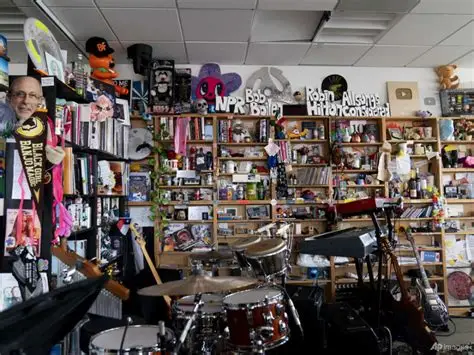When Afrobeats stars started popping up on NPR’s Tiny Desk Concerts, fans thought the genre had truly arrived. After all, Tiny Desk isn’t just a stage it’s a ritual. It’s where artistry is stripped bare, autotune takes a nap, and microphones tell no lies.
But as the dust (and some off-key notes) settled, one thing became clear: the road from Lagos to Tiny Desk is more complicated than it looks.
The Hype Meets the Reality
For a genre built on rhythm, confidence, and sonic gloss, Tiny Desk offered a new kind of test the kind where charisma meets craft.
Adekunle Gold, suave as ever, aced it. His golden-hour voice and sleek band fit perfectly into the Tiny Desk vibe. Tems turned the format into a prayer session intimate, soulful, and cinematic. Davido, ever the showman, brought global polish and Afrobeats warmth in equal measure.
Then came the others and things got… interesting.
Some performances exposed what happens when studio magic meets unplugged reality. Omah Lay, despite his hits, was roasted online for a shaky vocal delivery that lacked the emotion fans expected. Fireboy DML’s performance drew mixed reviews praised for energy but criticized for inconsistency.
It wasn’t terrible, but it wasn’t transcendental either. And that’s the thing: on Tiny Desk, “not bad” doesn’t cut it.
The Format Isn’t Built for Everyone
Let’s be fair Tiny Desk is a tough room. It’s cozy, stripped-down, and intentionally unglamorous. No flashy lighting, no backup dancers, no crowd to drown out missed notes. Just a mic, a few live instruments, and your soul.
Afrobeats, on the other hand, thrives on layered production heavy percussion, vocal stacks, and beats designed for movement, not meditation. Translating that into the Tiny Desk universe means rearranging songs, finding live chemistry, and revealing a new side of yourself.
Some artists rose to that challenge. Others simply showed up with a live band and hoped for the best.
Cultural Clash or Creative Evolution?
This whole experiment has split fans and critics alike. On one hand, Afrobeats artists performing at Tiny Desk signals progress proof the genre isn’t a niche wave but a global cultural force. On the other, it’s revealed a gap: performance depth.
For years, the Afrobeats machine has prioritized vibe over virtuosity. Studio perfection, viral hooks, and charisma did the heavy lifting. But Tiny Desk demands something else: musicianship, breath control, storytelling the raw stuff.
It’s not that Afrobeats artists can’t deliver that it’s that they rarely have to.
Tems understood the assignment because her music already breathes in silence. Adekunle Gold shined because he’s been experimenting with live arrangements since About 30. But for others, Tiny Desk became a mirror showing not just their talent, but their limits.
Social media Had Its Say (of course)
The internet, predictably, turned each performance into a referendum on the genre. After Omah Lay’s performance, X (formerly Twitter) was flooded with takes like:
“We love you bro, but NPR is not Quilox.”
Another user joked:
“You can’t bring club energy to a library concert.”
Still, some fans defended the artists, noting that adapting Afrobeats to intimate acoustic settings is a work in progress. “We can’t keep saying Afrobeats to the world and then panic when the world gives us a new stage,” one user wrote and they’re right.
Tiny Desk isn’t a test of genre; it’s a test of growth.
So, Was It a Failure or a Success?
Neither it’s a mirror.
Afrobeats at Tiny Desk isn’t about failure or triumph; it’s about translation. The genre is evolving from club soundtracks to cultural exports, and that requires evolution on the performance side.
If anything, these performances have forced a conversation within the industry: do our stars rehearse enough for live music? Do they rely too heavily on playback? Are they truly engaging with musicianship, or just performance energy?
The answers are uncomfortable, but necessary. Because as Afrobeats scales up, the expectations get heavier. And platforms like Tiny Desk, COLORS, and NPR don’t care how viral your last hit was they care if you can sing it without the studio.
Why It Still Matters
For all its stumbles, the Afrobeats–Tiny Desk experiment is still a milestone. It’s a seat at a table previously reserved for R&B minimalists, jazz prodigies, and alt-pop poets. Seeing Nigerian artists in that lineup normalizes their artistry beyond party playlists.
And, honestly, imperfections can be good PR. The world gets to see the process a genre learning to balance vibe with vocal, flash with feeling.
So no, Afrobeats didn’t “fail” Tiny Desk. It just hasn’t fully mastered it yet. And that’s fine. Every global genre from reggaeton to K-pop had to learn the art of translation.
What we’re witnessing is Afrobeats growing up one unplugged set at a time.
If Tiny Desk is a mirror, then Afrobeats has seen its reflection beautiful, brilliant, but still catching its breath. The vibe is there. The soul is there. The musicianship? A work in progress.
And that’s the story of every genre that dares to go global: before you conquer the world, you must survive NPR.


Leave a Reply